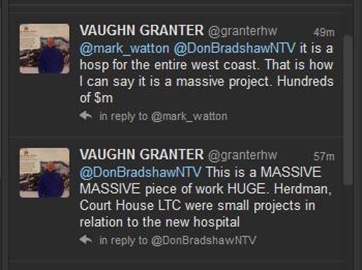It doesn’t matter if you are a Telegram editorial writer, a local blogger or even municipal affairs minister Kevin “Fairity” O’Brien on CBC’s St. John’s Morning Show (not online). You can still get the details of O’Brien’s travel expenses - things like purpose and amounts – just dead wrong.
So let’s just make sure we are all on the same page to start with.
The Public Cost of Kevin O’Brien
On Tuesday and Wednesday, CBC reported on the amount of money O’Brien’s department set aside to cover his travel and other expenses for the coming fiscal year. Last year, the transportation and communications budget was set at $44,900 but the final spending was $92,900. The 2012 budget is $44,900.
In 2010, the budget was set at $44,900 and the final spending came in at $61,000. In 2008 and 2009 O’Brien wasn’t the minister. The travel budget was $44,900 and the final tally was $44,100 and $35, 000.
You can see why people wondered what Kevin was doing. O’Brien blamed the 2011 cost over-run on Air Canada, the friggers, and their evil mainland-conspiracy airfares.
Yeah, well, no.
The Cause of the Cost
As your humble e-scribbler pointed out on Thursday, O’Brien’s department spent about half its travel budget to cover the cost of shipping their minister from his house in Gander to the office in St. John’s.
That’s the reason the travel bill was so high: government expense rules allow ministers to live somewhere other than near the place their job is located. Taxpayers foot the bill for the extra cost and that includes, among other things, these regular trips back and forth from his home to his main office to attend cabinet meetings and such. To distinguish it from travel for departmental business, your humble e-scribbler called it commuting costs. That’s what it is: commuting to work.
The Comparison
O’Brien isn’t the only one who does this. SRBP compared O’Brien’s expenses with those of Joan Burke, Tom Marshall, Patty Pottle and John Hickey for the period from December 2010 to November 2011. In terms of total dollars, O’Brien’s commuting cost was the second largest amount ($36,000) after Patty Pottle ($40,400).
As a percentage of total travel, Fairity was in the middle of the pack. Pottle’s commuting was 63% of her ministerial travel expenses. At 46%, Fairity was slightly below Burke (51%) and a dozen percentage points behind Marshall (58%)
But the key point is that none of that matters. They all cost taxpayers more than ministers who lived near their workplace, as ministers have done for decades.
And then there’s the House of Assembly travel costs
In addition to the travel costs these politicians cost taxpayers out of their ministerial travel budgets, each of them also ran up travel and living expenses under the House of Assembly accounts.
| Minister | 01 Apr – 30 Sep 11 | FY 2010 |
| Joan Burke | $6,058 | $18,309 |
| John Hickey | 7,384 | 15,788 |
| Tom Marshall | 7,221 | 14,017 |
| Kevin O’Brien | 9,742 | 16,695 |
| Patty Pottle | 14,012 | 25,559 |
Totalling the departmental commuting costs and the House travel bills are possible but it would take a bit of work. The departmental accounts are reported out of sync with the government’s fiscal year. The House of Assembly ones come at half way through the fiscal year and then with the whole year.
It would be even tougher to figure out how the two sets of travel claims relate to one another. The House lists huge amounts of detail, including specifically when the flights happened. The departmental expenses have two dates only on each item. it isn’t clear whether the first date is the date someone submitted the claim or the date they incurred the expense.
The Bottom Line
But even allowing for all that, you can see that Fairity’s annual cost to taxpayers for commuting would be something on the order of about $53,000 (36K +17K). And to give a direct comparison for Fairity with a minister from central Newfoundland, look at what Susan Sullivan cost taxpayers. Her departmental travel costs for the December 2010 to November 2011 time period was $26,068. Her House travel cost for Fiscal Year 2010 was $14,200.
In all these cases, the expenses don’t cover the costs of traveling to a meeting with a town council about a municipal grant or something directly related to the minister’s job.
Nope.
This is money that gets Kevin and some of his colleagues from their homes to their jobs. No other people on the public payroll get such a benefit. Historically, ministers haven’t been able to get taxpayers to cover their commuting costs either. This is a more recent invention, tied to the 2007 Green report and the way the Chief Justice structured House of Assembly allowances.
The cost to taxpayers is a good reason to review the whole thing and put it back on a basis that isn’t tied to where a politician lives. In the system established in the early 1990s, the House travel budgets tied the amount available to the likely cost of travelling to and from the district. That was never the problem in the House: the problem was a scheme that let members use travel money for vote buying. As such, there was no reason to change it in 2007.
Going back to a more practical system of setting House of Assembly travel budgets would disconnect ministerial travel from where a member of the House claimed a permanent residence. Since cabinet ministers’ jobs are at the government headquarters, they should live near by or cover the costs of getting to work themselves, like everyone else.
These costs wouldn’t matter if the provincial government had an unlimited supply of cash. As we all know, the taxpayers don’t have an unlimited supply of cash. If we have to cut back on expenses, then one of the logical places to start would be these sorts of discretionary – and entirely unnecessary costs.
- srbp -


